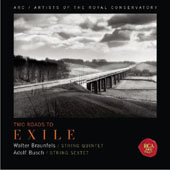

I very much admire a composer who, when writing for a small ensemble or a large orchestra, knows how to delegate the musical discourse equally amongst the various
instruments, a technique that lends the music a more organic, living sound. And that is precisely what Adolf Busch (1891-1952) achieves in his
purposeful and dramatic String Sextet in G major, Op. 40. The opening Allegro movement is bustling with energy and impetus, with
an eloquent main melody that travels from instrument to instrument while the rest of the players provide the backbone and momentum that drives the whole thing forward.
Imagine Brahms with more nervous energy, and you get an idea of Busch's style. The Molto adagio e cantabile which follows is no less eloquent, again with
various instruments taking on the lead duty along the way to create an ever evolving canvas. The Presto and Allegro con spirito movements
which close the work are exactly that. Fast and spirited, given a fugal treatment at times just bristling with inventive counterpoint. Each and every instrument has an
important role to play at every moment, each one doing something different, but yet you can tell that they all share the same goal and attain it as one. Great writing.
Walter Braunfels (1882-1954) on the other hand, using a more advanced harmonic language is more preoccupied with the emotional content within
the music than with techniques. His String Quintet in F-sharp minor, Op. 63 (of which this is a world première recording) opens with an Allegro
that projects a darker soul than his colleague Busch. It is nonetheless again written as an ensemble work, with all the players accounted for and each given an equally
important role to play within the group which gives the music a rich palette. The more austere Adagio which follows is beautiful in its stillness and economy
of notes, but does contain a very lyrical and emotionally charged middle section based on a creative treatment of a five note motif. The mood quickly changes as the
Scherzo comes in with fast, nimble and inventive music, full of interplay and a well defined rhythmic pulse. The final movement is quite a pleasant surprise.
It starts dressed up in the same dark cloak as the music that preceded it, but suddenly changes into a dance style, with an almost English pastoral element to it and a main
rhythm resembling a horse trot in the countryside. Needless to say it ends the whole work on a sunny note.
The title of this CD is Two Roads to Exile and was chosen because the composers on this recording, although of different backgrounds, were both
deeply impaired by the German activities during the 1930s. Adolf Busch, although himself a German, was profoundly ashamed and embarrassed by his countrymen's
actions at that time and himself wrote: "The anti-Semitic movement in Germany closes my Fatherland to me - as a German, I feel so revolted by what is happening that
the joy in making music, which for me is essential, has in its atmosphere altogether disappeared." At the outbreak of war, he exiled himself to the United States,
befriended Rudolf Serkin and together they founded the Marlboro Music School. He eventually became a well known and highly regarded violinist, and recordings that he
made as a soloist or as part of his own Busch Quartet, in particular some Beethoven String Quartets and the Bach Brandenburg Concertos with him conducting, are very
highly respected and are still on the market today. Paradoxically, Walter Braunfels opted to remain in Germany even though he was half-Jewish.
Because of that, his music was banned and he was relieved of his high standing duties at the Cologne School of Music. Therefore his exile was internal. He was a refugee
within his own country, and even today, most of his music remains in obscurity.
Again in this case, one must ask the question; "Why has music of this caliber been ignored all this time? Why is it that over the last 50 years record label executives have
released thousands of recordings of the chamber works of Mozart, but not one of composers like these?" Well now, thanks to the ARC Ensemble
(Artists of the Royal Conservatory) and the people at RCA, we can enjoy at least one and hopefully this will set a trend for the future.
This recording is a must not only for chamber music fans, but for anyone interested in discovering new works that given a chance will themselves become staples of the
repertoire. The ARC Ensemble are great ambassadors for neglected composers. I am convinced that their previous recordings of chamber works by Weinberg and Rontgen
have already influenced the popularity of those two composers, and created inroads for their music to flourish. I for one, upon hearing their rendition of the Weinberg
Piano Quintet, immediately listed it as a Definitive Recording on this website. This ensemble plays with so much conviction that you can't help but stop and listen to what
they are performing and in doing so, appreciate and admire these great works of chamber music.
Jean-Yves Duperron